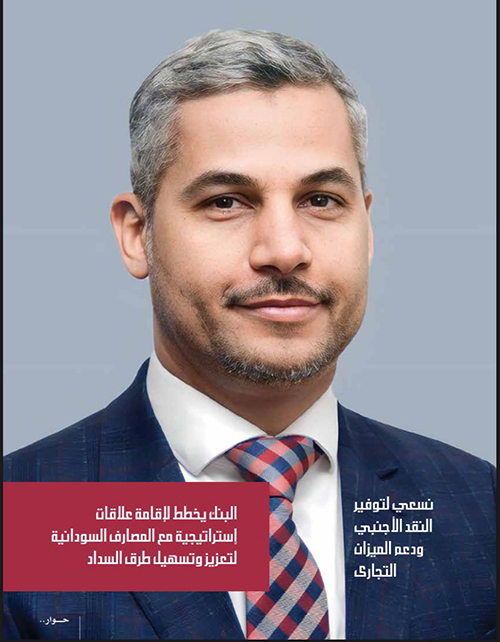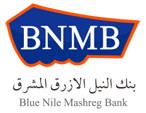Interview with the CEO of Blue Nile Mashreg Bank, Akram Al-Baloulah.
This is our vision to solve the problem of default that threatens Sudanese banks.
Interview by Tarek Sherif Sati
Blue Nile Mashreg Bank is one of the banks that has adopted a strategic approach, positioning itself on the shore of excellence. The CEO of Blue Nile Mashreg Bank, Mr. Akram Abdulazim Al-Baloulah, possesses distinguished expertise, graduating from international universities with a Bachelor’s degree in Economics from the American University in Cairo and a Master’s degree in International Relations from the University of Worcester, UK. He has worked in important institutions, including the Bank of Khartoum, where he established the Bank of Khartoum in Abu Dhabi as a general manager. Before that, he worked at the Unicons consulting organization, which prepared the microfinance strategy for the Central Bank of Sudan. Akram Al-Baloulah, with his high qualifications and qualitative experiences, has been an added value to Blue Nile Mashreg Bank. In this interview with Hawas Magazine, he discusses the interests of Blue Nile Mashreg Bank, the challenges facing Sudanese banks, and proposes ideas to overcome them.
Blue Nile Mashreg Bank is interested in microfinance. Blue Nile Mashreg Bank is keen on microfinance as one of the pivotal tools and fundamental solutions contributing to the development of Sudan’s economy. The bank adopts a strategic partnership approach with specialized companies for their expertise in managing microfinance projects. This is especially important as the Central Bank’s policies encourage the establishment of such companies while ensuring the repayment of loans to commercial banks. In light of the current challenges facing the country, Blue Nile Bank will focus on financing microfinance companies operating in sectors and areas that directly or indirectly contribute to enhancing the infrastructure for the development of exports, including crops, gold, or animal wealth. These, in turn, will play a role in providing foreign currency and improving the trade balance.”
“What are the challenges facing banks in the post-war period?
There are internal and external challenges facing banks in the post-war period that may lead to severe damage to the banking sector if not addressed quickly and effectively. Internally, the continuous devaluation of the Sudanese pound is one of the toughest challenges. This, in turn, leads to a real reduction in the capital value of banks, weakening their financial position and reducing their financing capacity. Since the majority of Sudanese banks rely on financing as a primary source of income, achieving the desired profits remains a challenge, especially in the presence of significant outstanding amounts due to borrower non-payment. This dilemma is exacerbated by the need for banks to compensate for the significant losses resulting from bank robberies and the reconstruction of destroyed assets, including buildings and technological equipment.
Externally, the biggest challenge will be maintaining relationships with correspondent banks, which may reduce their connections with Sudanese banks due to Sudan’s classification as a high-risk country with an ongoing conflict on its territory.
What are your plans and projects in banking technology?
In line with the Blue Nile Mashreg Bank’s strategy to provide banking products in line with the global banking technology revolution and the implementation of central bank policies supporting financial inclusion and electronic payments, the bank is making a concerted effort to find radical solutions to the obstacles facing Sudanese citizens in opening bank accounts. In this context, Blue Nile Mashreg Bank has introduced digital account opening services through the Mashreg application, making it the first bank in Sudan to link with the civil registry to verify provided data and then open an account in a process that takes no more than five minutes. The bank also collaborates with strategic partners to find suitable solutions for receiving remittances from Sudanese expatriates and delivering them securely and quickly. Additionally, the bank plans to establish strategic alliances with Sudanese banks to enhance and facilitate electronic payment methods among them.
Loan defaults are a problem facing banks. How do you view them?
One of the biggest contentious and complex issues that must be dealt with quickly and wisely is the problem of defaulted loans, which exposes banks to real problems in the credit field, potentially undermining confidence in the banking sector. Three essential components must be available. First, the central bank providing aid packages to banks to help them refinance troubled companies so they can operate again, repay their debts, and restructure. Second, companies committing to repayment and working to reconcile their situations without taking advantage of the situation by procrastinating in payment. Third, banks must be more flexible in calculating or even reducing their profit margins.
Blue Nile Mashreg Bank is one of the banks that has focused on developing its external relations. What is your plan for this file in the post-war period?
External relations with correspondent banks are one of the most challenging tasks historically faced by all Sudanese banks. Opening and maintaining accounts have been difficult. Correspondent banks dealing with Sudan are currently limited, and their commissions are often high, increasing the cost of financial transactions. There are several reasons for correspondent banks’ reservations about dealing with Sudan, including the Sudanese banking sector’s failure to adhere to global risk and compliance standards, classifying us as a high-risk country. Therefore, the plan of Blue Nile Mashreg Bank primarily depends on enhancing the culture of compliance and risk within the institution and ensuring the application of best practices in these two areas.
How do you view competition in banking, and who competes with Blue Nile Mashreg Bank?
Competition between banks is in the interest of the client and is necessary because it always places any bank outside the Comfort Zone, making it work hard to develop its products and services. The dilemma is that all banks compete for a specific segment or sector, i.e., the 11% – 15% that deals with banks. Therefore, I believe that competition should be in attracting the remaining segment that does not deal with banks, providing services and products that contribute to enhancing financial inclusion in the banking sector.
Blue Nile Mashreg Bank views all 36 banks in the Sudanese banking sector as competitors, particularly in the presence of banks with excellent financial standings and expert management. This phenomenon is considered beneficial and necessary to provide better services to customers. However, despite this, we consider them as important partners in developing the banking sector, believing in the crucial role of partnerships and collaboration, especially in this critical period our beloved country is going through. We see it as the only way out of the current challenges the sector is facing. It is essential to leverage the different advantages of banks in an integrated manner for the benefit of everyone.
Regarding bank management between the pioneer and youth generations, what are the differences in work?
At Blue Nile Mashreg Bank, our culture emphasizes respect for both pioneers and youth, without discrimination, in the work environment because each plays an important and central role in ensuring the continuity of the financial institution. There are experiences that are gained only over time, especially in Sudan, where the dynamics of work are different from other countries. Additionally, there are tasks that require the determination of the youth. The key in this equation is having management capable of prioritizing the institution’s needs and effectively integrating the talents of both pioneer and youth generations.
Another point we would like to clarify: Historically, Sudan had the most skilled and distinguished banking cadres who played a significant role in establishing and developing banks, especially in the Gulf countries. However, the prolonged period of international sanctions on Sudan prevented a whole generation from updating their banking knowledge, which has seen remarkable development over the past three decades. Nevertheless, we are confident that in the coming years, we will be able to catch up and restore Sudan’s name as a pioneer in the development of the regional and global banking sector, with the grace of God.
As quoted from Hawas Economic Magazine.


Blue Nile Mashreg Bank (BNMB) was founded in 1983 with a mission to provide reliable banking services and contribute to Sudan's economic growth. It has become a leading bank known for its technological advancements, stability, industry expertise, and customer-centric approach.
BNMB has experienced significant growth and is trusted by thousands of customers.

تأسس بنك النيل الأزرق المشرق (BNMB) في عام 1983 برسالة لتقديم خدمات مصرفية موثوقة والمساهمة في النمو الاقتصادي للسودان. وقد أصبح أحد اكبر البنوك الرائدة المعروفة بتقدمها التكنولوجي واستقرارها وخبرتها الصناعية ونهجها المرتكز على العملاء.
شهد بنك النيل الأزرق المشرق نموًا ملحوظًا ويثق به الآلاف من العملاء.
